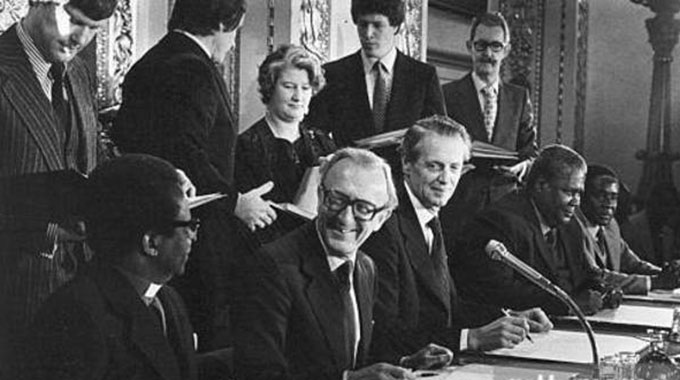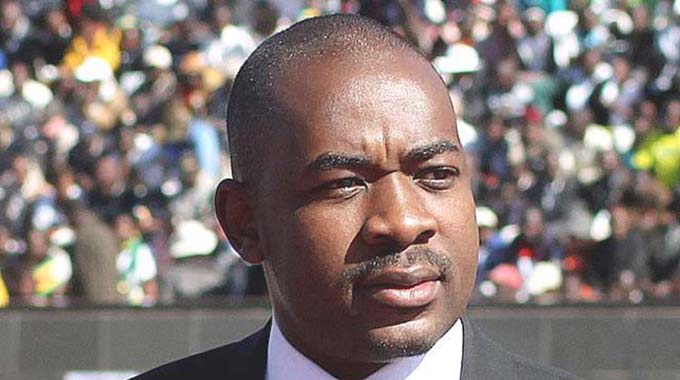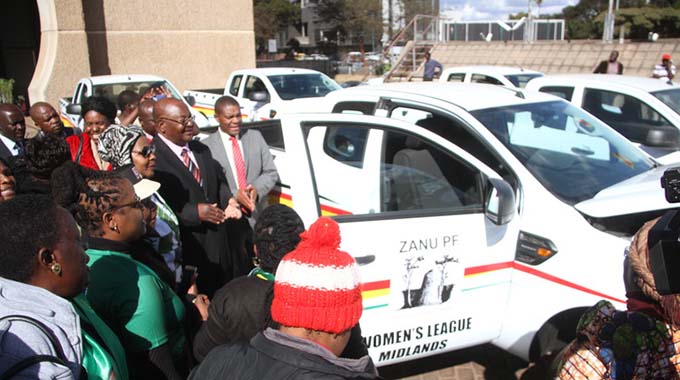Fare thee well, Lord Carrington. . . peer who played midwife to Zim’s birth

Sifelani Tsiko Senior Writer
The recent death of the last surviving member of Sir Winston Churchill’s postwar government and former UK foreign secretary, Peter Carrington, evokes memories of the famous Lancaster House talks of 1979 which he chaired and led to the independence of Zimbabwe.
When he assumed the foreign secretary’s job after 1979, his first major task was to end the protracted armed guerrilla war against Ian Smith’s government in Rhodesia and pave the way for multi-racial elections.
Many will remember that the Lancaster House talks, which he chaired in 1979, brought the various parties together and led to the birth of Zimbabwe.
The talks were tough and bitter with warring parties fighting to push forward their competing agendas and interests.
No matter the criticism that was piled on Lord Carrington, he won admiration for pushing the bargaining process further than any of the succeeding prime ministers and foreign secretaries who had grappled with Rhodesia question since 1965 when Smith declared independence, commonly known as UDI.
Analysts at the time said his ability to steer the Lancaster House talks that ended with an agreement endeared him to then British prime minister Margaret Thatcher.
He became the closest Cabinet adviser and a “real power in Conservative Party politics” despite the fact that he never sat in the House of Commons.
Lord Carrington was said to have succeeded to the title at 19 years of age, and that barred him from elective office.
Some recall him as a man who had inner toughness to handle tough diplomatic issues for the UK then.
It is said that Lord Carrington’s first major battle was to persuade Mrs Thatcher not to recognise the short-lived government of then prime minister Abel Tendekai Muzorewa.
His second major task was to convince Commonwealth leaders and the warring parties in Zimbabwe-Rhodesia that it was worth one more serious attempt to negotiate a settlement, and thirdly to prevent the Lancaster House talks from “degenerating into a formless series of ill-tempered debates”, as some political analysts at the time put it.
“His strategy for the negotiations grew out of his conviction that the principal British mistake in the past had been to act as a referee between the combatants. This time, he told associates, Britain would let them all state their case, then draft the best possible compromise and offer it to them, take it or leave it,” wrote one political analyst, R. W. Apple, in an article in October 1979.
Lord Carrington took total command of the talks, demanding that warring parties adhere to an agenda that he drafted and insisted on firm commitments from both sides on each issue.
All this took time when all the parties to the long-running war for the independence of Zimbabwe were under pressure to settle.
The Frontline States were also piling pressure on the Patriotic Front to stay put at the talks while the war-weary white Rhodesian settlers in Salisbury wanted recognition more than anything else and the British longed for an end to the war.
He had a tough job handling Patriotic Front firebrands such as Eddison Zvobgo, who is remembered for his mastery of verbal warfare skills at the Lancaster House Conference in 1979.
About 10 days before the signing of the Lancaster House Agreement, Zvobgo is said to have raised tempers when he told Margaret Thatcher to “jump into the Thames”.
Zvobgo at this crucial moment is also said to have insinuated that Thatcher was having an affair with “Satan Botha” – PW Botha – who was then South African prime minister.
In later years, one Zimbabwean political analyst recalled: “When Zvobgo felt that Lord Carrington, who was chairing the Lancaster peace talks, was trying to extract too many concessions from the Patriotic Front without corresponding pressure being applied on Ian Smith and Abel Muzorewa, he lashed out: ‘If Carrington carries on the way he has begun, plotting with puppets, we will go back to war’.”
Patriotic Front leaders were all clear in their demands for land and the return of the country to its rightful owners. They never wavered from this stand.
Pressure was mounting for all parties.
“The year 1978 was rather unique in that it was characterised by the formation of the Zimbabwe-Rhodesia regime, the bombing of multiple refugee camps and bridges by that regime in neighbouring states, the shooting down of two civilian Air Rhodesia aeroplanes by ZIPRA, a rocket attack on oil tanks in Salisbury by guerrillas, completely destroying them. By the beginning of 1979, it was quite clear that the Zimbabwe-Rhodesia administration was staring inevitable military defeat in the face,” wrote renowned Zimbabwean historian Saul Gwakuba Ndlovu.
With pressure mounting, Lord Carrington was forced to reassure veteran Zimbabwean nationalist Joshua Nkomo and Patriotic Front leaders that the British would sooner or later give Rhodesia back to its indigenous people – the Africans.
“Did Nkomo want the country to be surrendered to the Africans as the British found it or as they amalgamated it later?
“Nkomo replied very emphatically and emotionally that he wanted the country to be returned to the black people as a unitary state, and that the British government should not disunite the black people of Zimbabwe by balkanising their country,” wrote Apple.
In 2017, when former president Robert Mugabe met with Sir Nicholas, he reminisced on the role Lord Soames played in overseeing the transition to Zimbabwe, adding that “he had handled a very difficult situation which was tension-ridden”.
At the time he also reminisced over his reaction when Lord Soames told him to form a government after resoundingly winning elections in 1980.
He said Lord Soames told him that in constituting his Government, he should bear in mind there were “good white Rhodesians”.
This meant the likes of David Smith, Chris Andersen, Dennis Norman and Dr Timothy Stamps.
“But I said I have not run a Government,” President Mugabe said.
“So I said stay on for some time (as Governor) so you can usher me into this other sphere. When I made that request, Lord Soames exclaimed three times ‘Really, Really, Really’ whereupon he swivelled his chair and immediately rang Lord Carrington.”
Prime Minister Mugabe said Lord Carrington told him to “stay on but not for more than three months”, a response which made him happy.
All this goes to demonstrate the key role played by Lord Carrington in the transformative years of Zimbabwe’s politics.
Of course, there is a dark side, especially when it comes to his handling of the key question of who would compensate the white settlers when their land was distributed to blacks.
Even though Lord Carrington showed his diplomatic skills on the land question, it remained unresolved for several years.
In the formative years of Zimbabwe, Lord Carrington was well known here and he was UK’s point man on the powerful interest in keeping the focus on Britain’s role in land reform and protecting white minority interests.
He managed to push for an end to war but the war over land endured. The UK broke the financial commitments to support it and the Zimbabwe Government was forced to redistribute land to the landless majority.
Soon after Zimbabwe gained independence, the new Government argued that land remained an issue because of the constraints placed on it by the 1979 Lancaster House agreement to end white rule in the former Rhodesia.
Mugabe and Joshua Nkomo headed the liberation fighters’ delegation to the talks. From the beginning, Nkomo said that return of the land to the majority was central to their cause: “What will be the future of the people’s land?” he asked the British.
Margaret Thatcher’s government was largely interested in protecting the property rights of the white minority.
At the time, Lord Carrington insisted Zimbabwe’s new Constitution included a 10-year bar on the forcible redistribution of the farms.
“Mugabe – who once vowed that ‘none of the white exploiters will be allowed to keep an acre’ – wanted to go back to war. He was dissuaded by a promise from the UK to raise hundreds of millions of pounds for long-term land reform,” wrote a political analyst in the 1980s.
Outside the Rhodesia question, Lord Carrington famously resigned from Margaret Thatcher’s Cabinet in 1982 after taking responsibility for the Argentinian invasion of the Falkland Islands.
“The nation feels there has been a disgrace,” he wrote in his autobiography about the war. “Somebody must have been to blame. The disgrace must be purged. The person to purge it should be the minister in charge. That was me.”
This is said to have won him praise. “It was seen as an honourable act by a principled politician. It was one of the last times the doctrine of ministerial responsibility was observed, subsequent ministers preferring to blame others when things went wrong or brazen them out,” wrote a political commentator in an orbituary.
And, when the merits and the demerits of Lancaster House talks of 1979 are discussed, one name that will feature prominently, for right or wrong, is Lord Carrington’s.









Comments